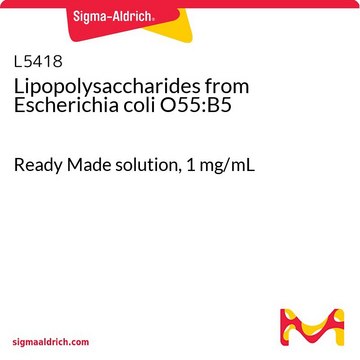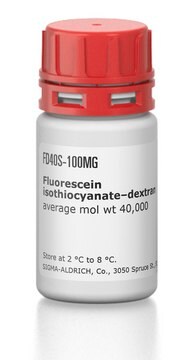MAK339
Lipopolysaccharide (LPS) Isolation Kit
sufficient for 10 isolation(s)
Se connecterpour consulter vos tarifs contractuels et ceux de votre entreprise/organisme
About This Item
Code UNSPSC :
12161503
Produits recommandés
Utilisation
sufficient for 10 isolation(s)
Application(s)
sample preservation
Température de stockage
−20°C
Description générale
The outer membrane of gram-negative bacteria contains lipopolysaccharide (LPS), a low molecular weight carbohydrate with a molecular mass of 10-20 kDa. It is heterogeneous and composed of O antigen (a repeating glycan polymer), core oligosaccharide (which links the O antigen to Lipid A - the third component, and non-carbohydrate components such as phosphate and amino acids groups. Lipid A, has multiple fatty acids which serve to anchor LPS into the bacterial membrane allowing the O antigen and core oligosaccharide to protrude and contributes to a major part of the toxicity of gram-negative bacteria. Also known as endotoxin, when consumed by animals, LPS induces a strong inflammatory response and/or sepsis.
Adéquation
Suitable for the isolation of Lipopolysaccharides from outer membrane of gram negative bacteria.
Principe
The Lipopolysaccharide (LPS) Isolation Kit uses bacterial membrane lysis buffer and protein digestion to yield micrograms of LPS from bacterial culture (approximately 1-4% of dry weight). This kit does not use chloroform or phenol like traditional methods, and it will yield pure LPS in less than 2 hours that can be easily characterized and quantified.
Mention d'avertissement
Danger
Mentions de danger
Conseils de prudence
Classification des risques
Met. Corr. 1 - Resp. Sens. 1
Code de la classe de stockage
8A - Combustible, corrosive hazardous materials
Classe de danger pour l'eau (WGK)
WGK 1
Point d'éclair (°F)
Not applicable
Point d'éclair (°C)
Not applicable
Certificats d'analyse (COA)
Recherchez un Certificats d'analyse (COA) en saisissant le numéro de lot du produit. Les numéros de lot figurent sur l'étiquette du produit après les mots "Lot" ou "Batch".
Déjà en possession de ce produit ?
Retrouvez la documentation relative aux produits que vous avez récemment achetés dans la Bibliothèque de documents.
Zhiyuan He et al.
Frontiers in nutrition, 9, 864080-864080 (2022-04-12)
Calf diarrhea induced by enteroaggregative E. coli (EAEC) spreads fast among young ruminants, causing continuous hazard to dairy industry. Antimicrobial drug abuse aggravates the incidence rate of multi-drug resistant (MDR) extended-spectrum β-lactamase-producing E. coli (ESBL-EC). However, knowledge of detection and
Notre équipe de scientifiques dispose d'une expérience dans tous les secteurs de la recherche, notamment en sciences de la vie, science des matériaux, synthèse chimique, chromatographie, analyse et dans de nombreux autres domaines..
Contacter notre Service technique





